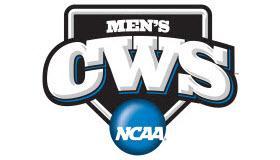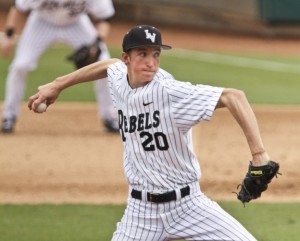
Hot on the heels of our “local college team” post earlier this week, the full 64-team field has been announced. (here’s a cool picture of all 64 uniforms in the tourney)
A preliminary announcement earlier on 5/26/14 stated the 16 regional hosts, each of whom is also automatically in the field. The full field announcement came later in the day (link from College Baseball Blog and nicely formatted regional pairings from BaseballAmerica). Oregon State got the #1 overall seed in the field of 64 and the Top 16 National seeds are:
- Oregon State: Pac-12 regular season champ (no tourney)
- Florida: SEC Eastern Division and overall regular season champion, Conference tourney runner-up
- Virginia: 2nd ACC coastal division
- Indiana: Big-10 regular season and conference tourney champion.
- Florida State: ACC Atlantic division champion.
- Louisiana-Lafayette: Sun Belt regular season and conference tourney champion.
- TCU: Big-12 2nd place regular season, conference tournament Champion
- LSU: 2nd SEC Western division, conference tourney champion.
- Rice: Conference USA regular season and conference tourney champion.
- Cal Poly: Big West regular season champ (no tourney)
- Ole Miss: SEC Western Division champion
- Louisville: American Athletic Conference regular season champion, Conference tourney runner-up
- Vanderbilt: 3rd SEC Western division
- South Carolina: 2nd SEC Eastern division,
- Miami: ACC Coastal Division and overall regular season champion,
- Oklahoma State: Big-12 regular season champion, Conference tourney runner-up
By inferring the stated match-ups of regional hosts, we infer the 9th-16 national seeds from the regional hosts: The 16 regional hosts *usually* are also the top 16 seeds of the tournament, though there have been some deviations from this in the past. However these seem accurate based on RPI rankings and typical top-25 votes.
Seeding Analysis: I thought Oregon State was slightly over-seeded at #1; I think you have to put Florida or Florida State there based on their record, Strength of Schedule (SoS) and the conferences they play in. Otherwise in some form or fashion I think your top 8 seeds are correct. Some are complaining about Indiana but their RPI and BA ranks are top 8 material and there’s no team seeded 9-12 that can make a real strong case to rise. I think teams like Houston, Washington and Texas were pretty hard done by not getting at least a regional host/9-16 seed. How does the Pac-12 get the #1 overall seed but its 2nd best team doesn’t even rate a top 16 seed? Meanwhile Houston is 10th in RPI and #15 in the latest BA poll, and they have to go to LSU to compete against a championship-calibre team.
(Note: CollegeBaseballBlog is reviewing every regional this week ahead of the weekend games. Click here for an example).
Easiest Regionals: Miami, who in their 42nd consecutive CWS appearance gets Ivy league champ Columbia as its regional THREE seed and a team with a losing record as its 4th seed. Of course, Miami’s prize will be a super-regional matchup with my tournament favorite Florida and a likely trip home. Oregon State’s regional looks incredibly straight forward; its #2 and #3 seeds are from smaller baseball conferences and its #2 seed (UNLV) just lost their friday starter (Erick Fedde) to Tommy John. Indiana’s regional looks pretty easy all things considered, and Florida State’s regional isn’t difficult, with middling SEC team Alabama and small conference schools to contend with.
Hardest Regionals: LSU; they get Houston, a team that should have been seeded as well as conference champ Bryant. Oklahoma State got no favors with Nebraska and traditional power Cal-State Fullerton. Rice gets #12 RPI ranked Texas to go with Texas A&M. Ole Miss gets 14th ranked and under-seeded Washington to go with 25th ranked Georgia Tech and a pesky 4th seed in Jacksonville State. Florida has three teams ranked inside of the RPI #50 in its regional; no cupcakes here and it includes the best #4 seed in the tourney (College of Charleston with local favorite Taylor Clarke). TCU gets baseball powerhouse Dallas Baptist to go along with Sam Houston State, a team ranked in and out of the top 25 all year. Lastly Louisville has a regional that looks like a fantastic basketball tournament; they have Kentucky, Kansas and Kent State. Kentucky and Kansas were in the top 25 as recently as earlier this month and this could be a very competitive regional.
Snubs: West Virginia was the highest RPI ranked team left out (#38) but that was mostly on their SoS; they were barely a .500 team overall and were just 9-14 in divisional play. Next in RPI rankings missing out were Mercer (#46), UCF (#48), and UC Santa Barbara (#50). Central Florida likely was the “last team out” and Clemson/UC Irvine were the “last teams in.” Duke may feel a bit unfairly done by; they finished ahead of two other NCAA teams in the conference standings. CAA champ William & Mary just didn’t have the SOS to get in after losing the conference tournament. Wright State won its conference going 25-4 in division only to lose the tournamnet to the team that finished dead last in conference play (Youngstown State).
(Links to other analysis from CollegeBaseballDaily blog, BaseballAmerica cool facts and tidbits, and BaseballAmerica field of 64 analysis by Aaron Fitt).
Local Rooting Interests: #3 overall seed and regional host UVA. Liberty (#3 seed in Charlottesville region), Old Dominion (#3 seed in South Carolina’s region), George Mason (#4 seed in Rice’s regional), and U of Maryland (#2 seed in South Carolina region). Tough matchup for Liberty. Maryland returns to the tournament for the first time in 43 years, an amazing fact. George Mason not only has to travel to Dallas, but they get two top 12 ranked teams in Rice and Texas. Its hard to envision any of these teams besides host UVA advancing.
Big-time draft prospects to watch: Many of the biggest names in the upcoming draft failed to make the tourney (Carlos Rodon, Bradley Zimmer, Sean Newcomb and Jeff Hoffman). But you will have:
- Aaron Nola, LSU’s friday night starter for the 2nd year running
- Max Pentecost catches for Kennesaw State.
- Michael Conforto, an OF with #1 seeded Oregon State
- Brandon Finnegan, TCU’s #1 starter (a lefty who may be in Washington’s sights if he drops to #18 in the draft)
- Tyler Beede, Vanderbilt’s #1 starter, who was a first rounder in 2011 out of HS but who failed to sign and has purported “make-up” issues (though finding links to whatever his transgressions may be are difficult)
- Kyle Schwarber, Indiana’s backstop
- Erick Fedde‘s team (UNLV) is in the tourney but he isn’t; he had Tommy John surgery a couple of weeks back. Remember this name; more than one pundit has the Nats drafting him in 2 weeks time.
- UVA has three 1st-2nd rounders of note as discussed here frequently: Derek Fisher, Mike Papi and Nick Howard.
See more of the guys in play by scanning down MLBdraftInsider’s latest mock draft. And mlb.com posted its link to the Tourney teeming with talent.
Regionals run from Friday 5/30/14 to Monday June 2nd (if needed).
My Regional winner predictions: I’ll go chalk with national seeds 1-8. After that most of the 9-16 seeds could be in trouble:
- I think Texas beats out perennially over-ranked #9 Rice.
- I think #10 Cal Poly doesn’t have the SoS to compete with either Arizona State or Pepperdine and will get beat.
- I like Washington over #11 Ole Miss.
- I think Kentucky can outlast #12 Louisville.
- I think #16 Oklahoma State could be in trouble with Cal State Fullerton looming as a pretty tough #3 seed.
- I worry about small-conference #6 Louisiana-Lafayette’s lofty ranking (they’re #1 in the final BA poll) but they got a pretty easy regional.
- Despite Houston’s pedigre I don’t think they can beat out #8 LSU, and someone has to go through Aaron Nola. And despite some complaints with #4 Indiana’s seeding their bracket is pretty easy.
Other pundit regional predictions: CollegeBaseballBlog and MinorLeagueBall/Chris Slade.
But no matter what happens, I hope they bring along the “Bat Dog” for one of the regionals 🙂
Useful College Baseball links to use: BaseballAmerica, and their top-25 lists. d1baseball.com is fantastic and is the best place to get updated information on day-to-day data, standings, and tournament results. PerfectGame.org has the best data on college players in their vast prep database. Warrennolan.com has the best guesses on college baseball RPIs. NCBWA does top-30 polls and other analysis.

